The Contenders in the Stretch
One of the strangest U.S. Senate races in the annals of Tennessee is coming down to the wire on August 3rd, in a three-way Republican primary that will determine who will end up challenging Democrat Harold Ford Jr. Conveniently for the Memphis congressman, Ford’s primary opponent, state senator Rosalind Kurita of Clarksville, dropped out just before the withdrawal deadline in April.
Meanwhile, Memphian Ford, who has represented the 9th Congressional District since 1996, continues to reap campaign contributions and unprecedented national media attention as he watches the Republican stretch drive, one in which former Chattanooga mayor Bob Corker seems to be pulling away from two ex-congressmen — Ed Bryant, formerly of Tennessee’s 7th District, and Van Hilleary, who represented the 4th District.
Consistent with their former bailiwicks, Bryant is strongest in West Tennessee, though he also claims strength in Knoxville and in the Tri-Cities area of the state’s northeastern corner, while Hilleary seems to have greater strength in Middle and East Tennessee. Both, however, have watched more or less helplessly as the well-heeled Corker has put on a media blitz that their relatively cash-poor campaigns have not been able to match.
Unlike his GOP opponents, Corker can seemingly afford to manifest himself on the airwaves anytime and anywhere. During one recent week, Bryant, whose campaign featured a restrictive immigration policy early on, tried to capitalize on the then red-hot issue by going to the Texas border and arranging a conference call with the statewide media. Corker, however, had beaten him to it. For a solid week, a well-produced TV commercial played in every Tennessee media market, showing the Chattanoogan articulating his immigration views with a fenced-in section of the Texas-Mexico boundary serving as his backdrop. Bryant, by contrast, was at the mercy of whatever free media might come his way.
But at least Bryant was making the effort. By mid-May, just as Corker’s advertising barrage was getting under way, Hilleary, the onetime leader in the Republican race, had largely stopped campaigning in West Tennessee. In a public “Dear Ed” letter, he extended the olive branch to opponent Bryant and proposed that the two mount a joint stop-Corker movement: “Let’s come together for the good of the cause — running hard on our own merits and ‘focusing our fire’ only on the candidate who does not share our mutual conservative philosophy, Bob Corker.”
Simultaneously, Hilleary’s campaign people were letting it be known that they were counting on Bryant to hold off Corker in West Tennessee, where, they admitted candidly, they were at a serious disadvantage, both financially and organizationally. Some of Bryant’s chief backers acknowledged that their man had similar problems in the eastern part of the state, where they hoped Hilleary could provide something of a buffer.
“All the latest polls show me with a two-to-one advantage,” Corker said during a stopover in Memphis last week. “That’s a big difference from 60 days ago,” he said with a wink, acknowledging that he had been just as far behind the others back then. Tellingly, in a brief rally with his supporters at his East Memphis headquarters, Corker had not deigned even to mention his two GOP rivals.
“We haven‘t reached the pond–scum level yet.”
It had been otherwise with Bryant only days before, when he confided his thoughts to the faithful at the opening of his Poplar Avenue headquarters. Corker’s rise in the polls, stemming from a series of TV spots that had been impossible to miss for anyone who watched even a little television, was the launching point for what Bryant said to say:
“We knew that $4 or $5 million could buy a lot of name recognition, which it has. It’s inevitable that he has taken a bump in this race,” he began. And then Bryant offered reassuring words to his troops. Suggesting that opponent Hilleary might be on his last legs: “Our benchmark poll showed that Van’s support was very soft, and, basically, Bob has rented Bob’s support. Our support is hard, and it’s going nowhere.”
Bryant went on: “It’s amazing that Bob has spent that kind of money and doesn’t have this race wrapped up!”
Bryant deviated from the subject of Corker to talk about his own TV commercial, just then about to make its debut. The ad, when it appears, will emphasize Bryant’s past as an instructor at West Point and his years as U.S. attorney in Tennessee’s Western District. Referring to Bryant as “a conservative leader we can trust,” the ad’s anonymous voice-over concludes with an extraordinary claim: “Ed Bryant will secure our borders. And win the war on terror.”
Bryant’s people murmured their approval that he’s actually begun to compete with Corker on TV, and a burst of excited applause ensued.
Then it was back to the subject of Corker, whose sudden burst in the polls may be the immediate pretext for Bryant’s focus. But the fact is, Bryant’s campaign has never deviated from its preoccupation with the ex-Chattanooga mayor who made a fortune by constructing affordable housing for people with modest incomes, then waged and lost a Senate campaign in 1994 before serving as finance commissioner in the first term of former Republican governor Don Sundquist.
Corker’s mayoralty came next, and, though he and various others regard it as having been successful, Bryant and, to a lesser extent, Hilleary have done their best to undermine that view. In Bryant’s case, not a day has gone by for months — literally — without an attack on Corker’s bona fides as a conservative or even as a reputable executive. Many days see several such attacks, but one in particular goes out without fail, day after day after day, to the state media and to Bryant’s network of supporters and prospective voters.
This is the “Daily Fraud Watch” e-mail, which, as of Monday, had been distributed for 145 consecutive days, virtually unchanged since the day when it first circulated — referring to several unnamed individuals who served in Chattanooga’s city government when Corker was mayor and have since been charged with a variety of derelictions, including some indictable offenses, and come under fire from Corker’s mayoral successor. (No evidence has ever been adduced in the e-mails that would link Corker to any of these former employees.)
Bryant, as one observant blogger noted months ago after seeing him for the first time at a forum, looks distinguished and, well, senatorial, especially now that his still-boyish good looks have begun to gray over. His personal integrity is unquestioned, and he is, as all who know him can attest, the very incarnation of the term “nice guy.” (Indeed, as one of the House “managers” of the Clinton impeachment in 1998, he drew the assignment of interrogating Monica Lewinsky and, in the judgment of almost everybody, went so easy on her that she dominated their dialogue.)
Now, as he takes stock of his campaign before this group of diehard supporters in his headquarters, nice guy Bryant seems aware that some accounting of his campaign tactics is called for.
He jokes about his first Senate race, about “that horrible negative campaign we had with Lamar Alexander in ’02, when I attacked him for being plaid and [said] I was solid.” And he reminds his listeners about the famous — or, some would say, notorious — “six-pack race” in the Republican Senate primary of 1994.
That race was ultimately won by Bill Frist, an independently wealthy first-time candidate who rose to become Senate majority leader and is now a potential candidate for president. It is this seat, which Frist is vacating, that this year’s hopefuls are now seeking.
There was real trash in that 1994 Senate race, Bryant noted, recapping some of the more flagrant epithets, concerning “draft dodgers” and “cat killers” and “desperate little men” and “pond scum.”
Bryant paused. “We haven’t reached the pond-scum level yet.” He then went on to raise questions about Corker’s candor regarding personal finances. “We’re going to be talking some more about his failure to give out his tax returns, whether he’s donated to organizations like NARAL [National Abortion Rights Action League] … I don’t know.”
And he repeated allegations — previously raised, he said, by Democrat Ford — that one of Corker’s construction companies had illegally employed alien workers for “a taxpayer-funded project” on Mud Island. Other employers may have done something similar, Bryant said, but Corker was “the only one out there who’s running for the United Sates Senate.”
“You seem like a great fellow.”
If Corker’s ears were burning, he didn’t show it when he hit Memphis a few days later for his own headquarters visit with supporters, followed by some carefully orchestrated door-to-door campaigning.
“I’m running a different kind of race from my opponents,” he maintained on the drive to a nearby White Station neighborhood. He had made a point of refraining from invective, Corker insisted — though, in fact, he had hurled several different kinds at Ford, accusing the congressman of frequent and questionable trips paid for by the taxpayers and by private interests.
“To some degree, the negativity of both of the other campaigns has hurt them,” Corker said. “I think it’s been a poor strategy. The way you run a race is the way you serve.”
And yes, for the record, the former mayor was asked about the alleged fraud which occurred, as the Bryant e-mails put it, on his watch. “It’s absurd, ridiculous,” Corker said. “I’m proud of my record as mayor. I was the first to put in a performance audit.”
He boasted of his “highly organized, very disciplined” campaign. “We’ve knocked on 45,000 doors. We have the most broad-based effort in history, with postcards going out to potential supporters throughout the state.” Since January 2005, when the still new-looking SUV he was riding in had been bought, “we’ve put 100,000 miles on it,” Corker said, adding proudly, “It’s only been out of commission once.”
Corker himself would seem to be in good commission. A small man in his 50s, he is an early-morning jogger, doing three to five miles every day. “It’s the only way to stay sane,” he said. It’s also the only way to go door-to-door the way he does, running the distance from wherever he happens to be to the homestead where one of his young aides has preceded him to find somebody at home.
There is nothing random about the way Corker and his team work door-to-door. This neighborhood, for example, a posh one, had been pre-screened as possessing a certain number of households where registered Republicans likely to vote reside. These are the doors Corker comes to, running up the walk or across the yard and materializing on the resident’s stoop. It could be taken as a stunt, unquestionably, but it makes a statement.
Given the advance preparation, the chances are good that the candidate will be greeted cordially. At most doors he will get, at the very least, some friendly conversation, and, quite often, he will be invited to leave one of his yard signs, which he puts in the ground himself.
Meanwhile, his young aides — some running alongside him, others walking behind at a distance, still others keeping up with him by car — are, as Corker explains, “counting the doors,” adding to that 45,000 total. “That number is going to rise geometrically,” he promised. Most, of course, will be knocked on, not by Bob Corker himself, but by one of his volunteers.
“We actually go faster without him,” said one aide. And it’s easy to see why. Since almost everybody who opens the door has been pre-selected as a politically active Republican, it would be strange indeed if they did not avail themselves of the opportunity to log some chatting time with the candidate.
On this day, there are an uncanny number of people who hail from East Tennessee or know people who do and have a connection to someone who knows Bob Corker.
Not that there aren’t unknown factors. At the door of a retired rabbi, Corker chatted at some length concerning his recent trip to Israel, telling the rabbi, a white-bearded kindly-looking man with a yarmulke, how moved he had been in Jerusalem to visit the Wailing Wall.
Corker and the rabbi seemed to mesh gears perfectly as they discussed issues relating to the Israeli-Palestinian conflict, even concurring that the victory of the militant organization Hamas in recent Palestinian elections might turn out to have positive results. “Now they will have to learn to govern,” the rabbi said, and Corker nodded in agreement.
Out of nowhere the rabbi threw Corker a curve. “Now, Bob,” he asked, “what about that Statue of Liberty with a cross?”
Corker was clearly baffled by this reference to the new and controversial statue, which had been erected at the Church of the World Overcomers in southeast Memphis. And even after it was explained to him, he — no doubt wisely — left the talking to the rabbi, who went on to say, “When you have a community that thinks America is one religion, that’s wrong! The Statue of Liberty holds the Star of David and other religions as well.”
Finally, the rabbi pronounced what came across as a benediction. “I’m impressed with you, Bob. You seem like a great fellow.”
After an hour of this, or dashing up to doorways in 90-degree weather and carrying on extended conversation with homeowners, Corker’s shirt was soaked through with sweat.
Corker was asked: What percentage of the people he has met today knew who he was?
“All of them,” he said confidently. His advertising barrage has done its work.
“A candidate trying to be what he is.”
The two other Senate contenders, Hilleary and Ford, have logged somewhat less time in Memphis and Shelby County of late but for opposite reasons. Ford, who is presumably well known locally, is devoting most of his time, when not in Congress, to firming up his identity elsewhere in Tennessee.
As for Hilleary, reality has dictated his relative scarcity of late in these parts: “We can’t afford to run everywhere” had been the candid assessment of one of the former congressman’s top aides back in May. To be sure, Hilleary still does his best to make the usual courtesy stops expected of a statewide Republican contender, showing up here for events like the annual Lincoln Day Dinner in February and the GOP’s “Tennessee Homecoming” event that was held in May.
At the latter event, though, a straw vote poll confirmed what everybody already knew — that, insofar as there was a favorite son among local Republicans, it was Bryant and by a wide majority. That fact, coupled with Corker’s recent upsurge, has caused Hilleary to concentrate on votes east of the Tennessee River, though he can still boast a strong pocket of supporters in Tipton County, just north of Shelby.
All in all, though, Hilleary seemed clearly not to be flying as high as he was as recently as April, when he touched down in Memphis on his formal “kickoff” fly-around. At that stop, he had referred to the Senate race as a “a very important job interview for a very important job,” and he offered a set of credentials that included his service as navigator on 24 transport missions during the first Gulf War in 1991.
“We need fighters here,” he said, “who will fight against tax increases and for taxpayers, who will fight against those in Hollywood who would tend to corrupt our culture. We don’t need a Democrat like Harold Ford, who would cozy up to the Hollywood culture. Nor do we need Republicans who arrogantly raise our taxes and have forgotten that it’s not their money; it’s the public’s money.”
It was the kind of message that Hilleary, a resident of Murfreesboro, was long used to pitching to the small towns and rural communities of the 4th District, unique among the state’s nine congressional districts in that it snakes around all of the major media markets. Hilleary had represented the district for eight years before vacating his seat in 2002 to make a race for governor. It was that race that gave him the statewide name recognition that, as he boasted back in April, had allowed him to enter the Senate race as the acknowledged front-runner. It was also the race, however, that revealed some of his vulnerabilities, as he surrendered just enough traditionally Republican votes to Democrat Phil Bredesen to allow Bredesen the victory.
Hilleary was, perhaps justifiably, jealous of what he regarded as his own hard-earned reputation as a conservative and wary of others’ pretenses. “You see Hillary Clinton trying to run as far to the right as possible. You see Harold Ford trying as hard as he can to get over to the middle. You see Bob Corker trying to get to the Republican right. It’d be nice, just one time, to see a candidate who’s trying to be what he is.”
“I’m not a Democrat … running up to Washington yelling, ‘Democrat, Democrat, Democrat.'”
Meanwhile, Harold Ford was alternating between his congressional duties in Washington and building those bridges in Middle and East Tennessee.
He was also turning up with some regularity as in interviewee or subject in this or that corner of the national media. A box in Newsweek one week, a front-page profile in The New York Times the next, and, virtually on a weekly basis, a sit-down on Don Imus’ morning show on MSNBC, where the host has long since abandoned any pretense of neutrality, calling for the election of Ford to the Senate “if there is a God in Heaven.”
The story line regarding Ford might vary slightly from venue to venue, but what it all comes down to, over and over again, is something like this: Can a bright young African-American congressman overcome racial bias and his family history to win a pivotal border state for the Democrats in November? Whoever ends up as Ford’s Republican opponent would do well to realize the implications of this:
First of all, questions posed in that manner tend to contain an affirmative, self-fulfilling answer within them. Secondly, such a story line means that discussion of the general-election Senate race is likely to focus on Ford and, in a striking sense, to be about Ford in a way that might render his opponent as little more than his foil.
Largely overlooked, both in national coverage and in the attention paid Ford’s candidacy by the Nashville-based state media, has been the animus toward Ford on the part of a corps of hard-core Yellow Dog Democrats throughout the nation at large and plentiful enough in Ford’s own back yard. At more than one meeting of the Germantown Democratic Club over the past year or two, Ford was taken to task for his increasingly conservative rhetoric and for his continued, if somewhat qualified, support of the military mission in Iraq.
And to a network of local liberal bloggers, Ford had long since become something of a bête noire for his votes on Iraq, for his approval of a congressionally ordained review of the Terri Schiavo matter, for legislation against flag-burning, for his vote on behalf of a severely restrictive bankruptcy law, and for his vote this year to make permanent the tax cuts which most of his fellow Democrats regard as sops to the wealthy.
(Ironically, of course, the official and unofficial organs of the Republican Party continue to churn out press releases attacking Ford as a “liberal.”)
Disaffection with Ford’s campaigning style has belatedly begun to seep into the consciousness of some Democrats elsewhere as well, even as most party cadres seem uplifted by his increased viability. Henry Walker, a lawyer and sometime pundit whose views count for something in Nashville, referred to Ford’s nickname for the three Republican contenders when he told The Tennessean this week, “I’m disappointed in the kind of campaign he’s running, when he’s trying to run to the right of the ‘Three Stooges.'”
Ford himself seems not to be bothered by such criticism. Buoyed by demonstrations of his fund-raising prowess, which in the last quarter showed him forging ahead of money-man Corker, and by polls which increasingly show him to be at least competitive in a race with any of the three Republicans, the congressman felt confident enough to proclaim to a crowd of local supporters in April, “I’m not a Democrat … running up to Washington yelling, ‘Democrat, Democrat, Democrat.'”
It was a distance from party orthodoxy that he must have felt he could afford, given that the day before, Ford’s only party rival for the nomination, Kurita, had withdrawn her bid, due to lack of attention and financial support from traditional Democratic sources.
Ford clearly assumes that most Democrats, even the Yellow Dogs, will reach the same conclusion as did lawyer Jeff Bloomfield, a Germantown Democrat who, contemplating a possible Ford-Corker general election showdown, said last week, “The question is, would I rather elect a conservative Democrat who would vote with the Democrats on most issues when Congress is reorganized next year, or would I rather elect a moderate Republican who will vote with his party? I’ll go with Ford.”
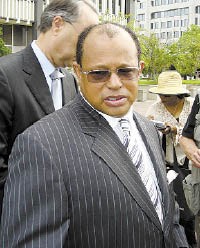
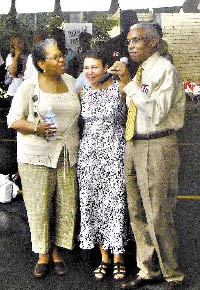 Jackson Baker
Jackson Baker 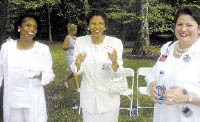 Jackson Baker
Jackson Baker 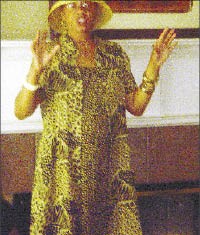 Jackson Baker
Jackson Baker  Jackson Baker
Jackson Baker 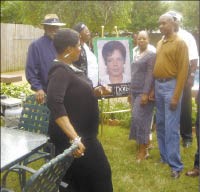 Jackson Baker
Jackson Baker  JB
JB 
